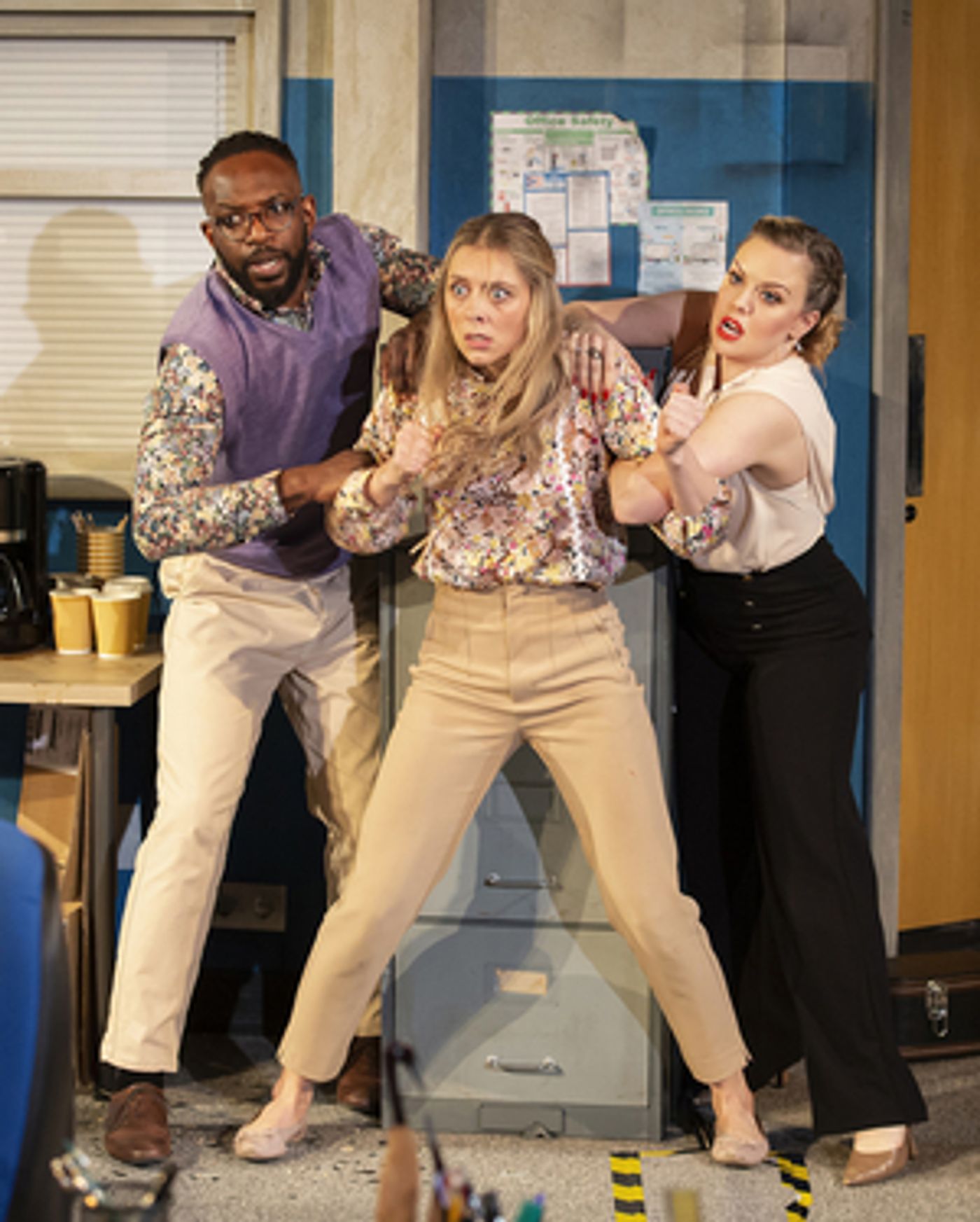Review: WINDFALL, Southwark Playhouse
Mundane office descends into a vision of hell when a lottery win divides a syndicate

 As I always say to students facing exams, "Read the question!" The same advice adapted for for reviewers is "Read the title!" So, Windfall? It's a both an unexpected financial gain and what's left on the ground when a gale blows through an otherwise serene orchard. In Scooter Pietsch's madcap American comedy, transferring to London after a successful New York run 2022, both meanings are very much to the fore.
As I always say to students facing exams, "Read the question!" The same advice adapted for for reviewers is "Read the title!" So, Windfall? It's a both an unexpected financial gain and what's left on the ground when a gale blows through an otherwise serene orchard. In Scooter Pietsch's madcap American comedy, transferring to London after a successful New York run 2022, both meanings are very much to the fore.
We're welcomed by an offstage DJ cycling through what might be Now That's What I Call Music 27, who returns in the interval - nobody seemed sure why. Once Debbie Harry stops imploring a man to "Call Me" (like she ever needed to) we open on an office furnished with what was definitely the lowest price options in the supplies catalogue, and a group of workers who are pissed off with life, the universe and everything.
After a lot (and it really is a lot) of character exposition - the owner is horrid, the manager is sex-crazed and lonely, one worker drinks too much, another is trapped in an unhappy marriage and a new starter is a threat, conscientious Galvan, who likes quoting the scriptures with a touch of Samuel L. Jackson's Pulp Fiction zeal, lurches the plot into life. He has a vision (or, should I say, A Vision) of winning the lottery if they can put $911 each into the pot and recreate events exactly as foreseen. They try, but they can't as temptation supervenes and they discover that the prospect of unimaginable wealth blows professionalism, relationships and even common decency down into the dirt.
It's farce and, like panto, opera and Beckett, it's important to accept its conventions and not dwell too much of whether real life is actually like this. But, as John Cleese and Connie Booth said many years ago in an attempt to catch Fawlty Towers' magic in a bottle, farce has to be internally consistent. Too often in the wild second half, I found myself whispering "Why would he do that?" "Why is she saying that?" "Nobody would risk that would they?" The need to shoehorn extreme behaviour into every character arc, more or less destroying them, makes one wonder why we sat through all that set up in the first hour.
The play is not without its funny moments as the more plausible reveals come forth in an office that the prospect of millions of dollars has turned into a version of the island in Lord Of The Flies. The cast land their laugh lines and choreograph the violence skilfully, director, Mark Bell, showing his The Play That Goes Wrong heritage. But we don't, as they would say in Ohio where the play is set, have anyone to root for. Gabriel Paul is excellent as the visionary, Galvan and Jack Bennett gets plenty of laughs as the hideously Brentish boss, Glenn, but do we care if this motley crew win or lose? No we don't.
There's also a detectable unease in the house with some of the violence. Jackass and the Fail Army videos on YouTube have shown that there's still an appetite for giggling at people falling on banana skins, but this play feels different. Here the violence is inflicted by one character on another and not the result of someone's own foolishness in taking a risk and it going wrong.
There are reasons why The Three Stooges do not attract the same love as Laurel and Hardy and that crucial difference is one. Perhaps the time when a slip of a girl could be set upon by three or four assailants with a paper shredder, all done in the service of laughs, is passed. It certainly has for me.
Windfall is at Southwark Playhouse until 11 March.
Photo Credit: Pamela Raith
Reader Reviews
Videos

